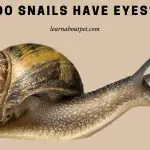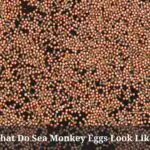It can be quite alarming to note that your pet praying mantis’ eyes have turned black. The moment you realize that your praying mantis’ eyes have turned black, you will want to know whether it is normal, why it happens and what can be done about it. This article answers all those questions.
Why do praying mantis eyes turn black? Praying mantis eyes may turn black as an adaptation to low light conditions. There are also cases in which black mantis eyes may be a sign of dehydration or illness.
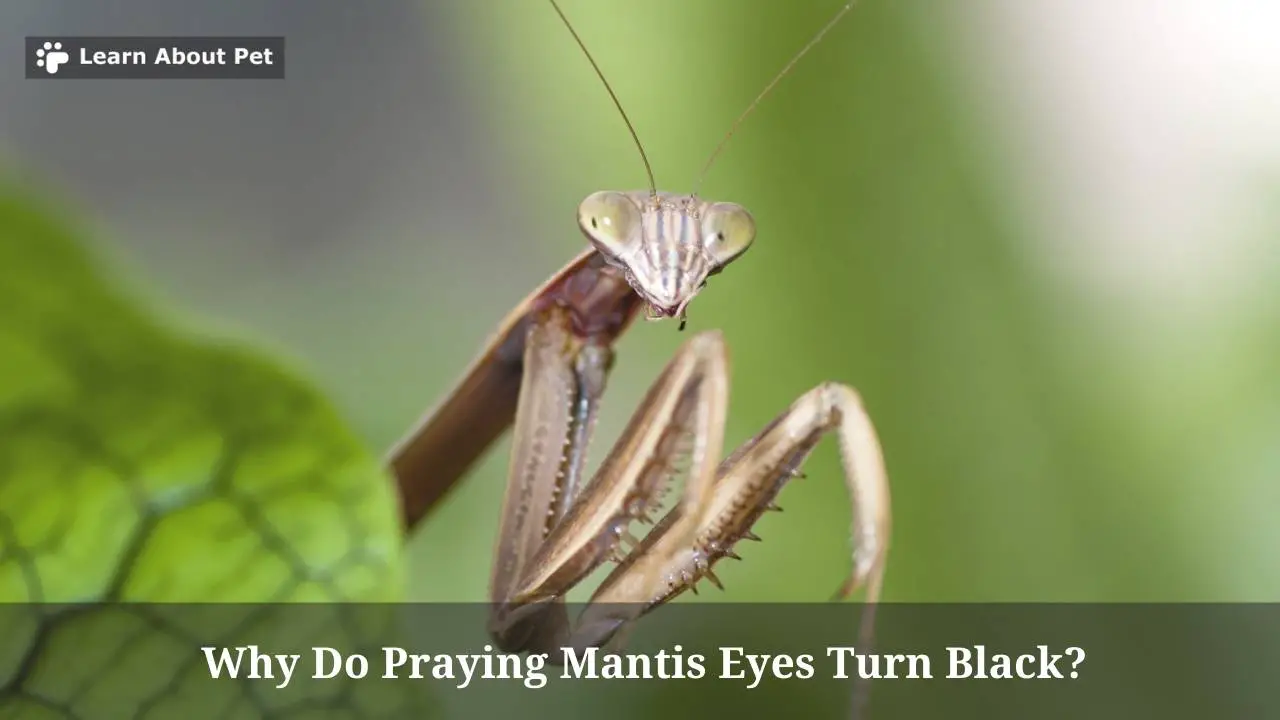
The key thing to know is that praying mantis’ eyes do often change color. Indeed, one of the most frequently asked questions about the mantises is on why do praying mantis eye change color?
And in some cases, the color change is one in which you specifically find the eyes turning black.
Sometimes, the eyes actually turn black as the mantises are eating. And this gets people wondering, why do praying mantises eyes turn black when they eat?
At other times, the mantis’ eyes turn black only at night. And that gets people seeking to know, why do praying mantises’ eyes sometimes appear to be black at night?
Or, more generally, what does it mean when a praying mantis eyes changes color at night?
Ultimately, if you find that your mantis’ eyes have turned black, it would be understandable for you to keep on asking yourself, why did my praying mantis eyes turn dark or black?
You may even find yourself moving around, asking people, ‘does anyone know why this praying mantis has black eyes’?
Thus an ideal place to start would perhaps be by finding out whether, in the first place, it is normal for mantis eyes to turn black.
Is It Normal For Praying Mantis Eyes To Turn Black?
It is quite normal for praying mantis eyes to turn black. At least, we can say that it is something which happens to all mantises under certain circumstances. So it is ‘normal’ to that extent.
Therefore if, for instance, you find your mantis’ eyes turning black at night, that is quite normal. It is what you would expect for any mantis at night.
While, for instance, the default Chinese mantis eye color may be light green or tan, they can nonetheless blacken at night.
The key thing to understand is that praying mantis eyes becoming black is normal. However, some of the reasons for the eyes turning black may require attention.
What Does It Mean When A Praying Mantis Eyes Turn Black?
Sometimes, praying mantis eyes may turn black because the mantis is under low light conditions. Thus it is quite common to find a praying mantis with black eyes in a dark room.
At times, when a mantis is under low light conditions, there may actually appear to be black dots on its eyes. And that gets someone wondering, what are the black dots on the eyes of the praying mantis?
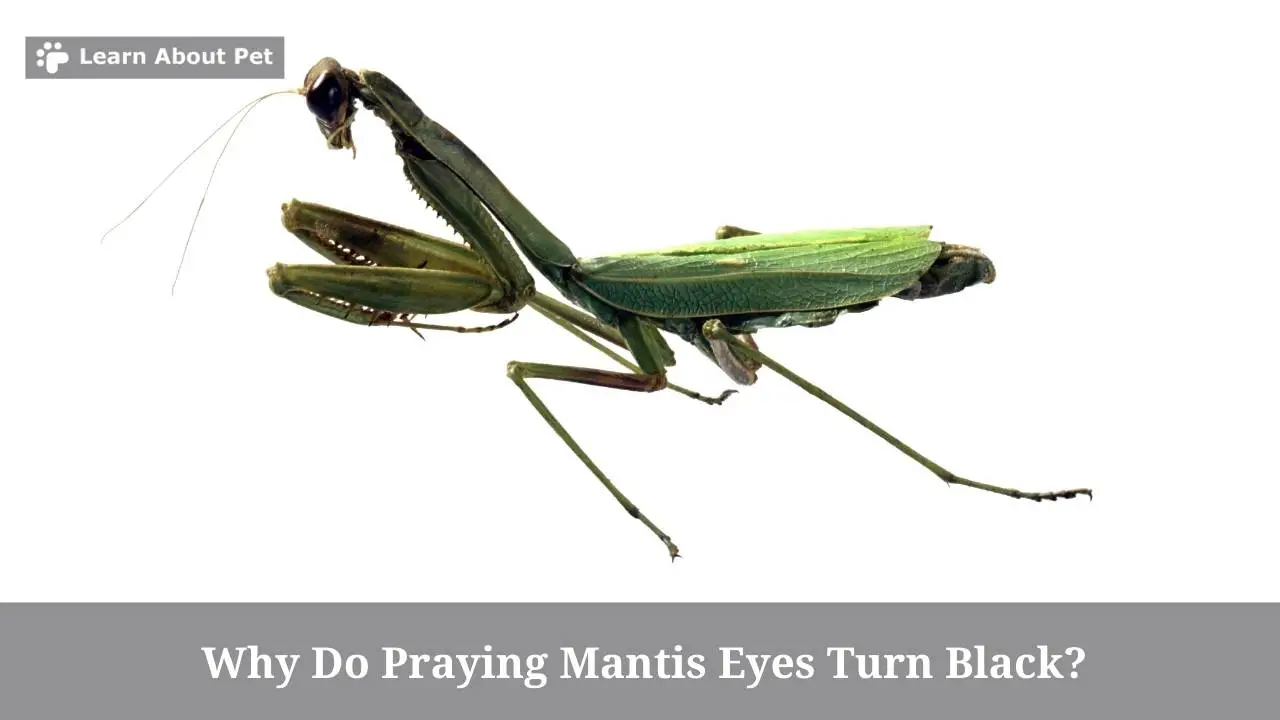
And those turn out to be the mantis’ compound eye features, functioning in sub-optimal light conditions.
There are also times when a mantis’ eyes turn black due to dehydration. In this case, the eyes remain black both in low light and high light conditions.
Further, are scenarios in which a mantis’ eyes turn black due to illness. Often, a mantis in this sort of problem will experience eye rub.
It can even get so bad that you find the mantis owner wondering, “is there any way to cure eye rub? My mantis’s eyes are turning black because of it”
Thus some bacterial or fungal infections may actually make a mantis’ eyes turn black.
Why Do Praying Mantis Eyes Turn Black At Night?
Praying mantis eyes turn black at night in order to adapt to the low light conditions that prevail at night.
So in the most practical sense, that is the reason why praying mantis eyes turn black at night.
You then find the eyes going back to their normal color at daybreak.
What Should You Do About Praying Mantis Black Eyes?
If the mantis’ eyes have turned black due to it being in low-light conditions, you don’t need to do anything. But observe the mantis, when there is bright light, to see if the eyes go back to their normal color.
If they remain black even in normal light conditions, there may be an actual underlying problem: either dehydration or illness.
In case the mantis’ eyes are dark due to dehydration, offer rehydration support.
And if the mantis’ eyes are dark due to illness, consider initiating the necessary treatment. Even if you are unable to take a mantis to a vet, you can at the very least think in terms of things like what to feed a sick praying mantis to improve its health.
Final Verdict – Why Do Praying Mantis Eyes Turn Black
Sometimes, praying mantis eyes turn black because the mantis is under low light conditions. So the blackening of the eyes is an adaptation to the darkness.
At other times, praying mantis’ eyes turn black because the mantis is dehydrated.
And at other times, you find the mantis’ eyes turning black because the mantis is unwell. So a bacterial or fungal infection can make the mantis’ eyes black.
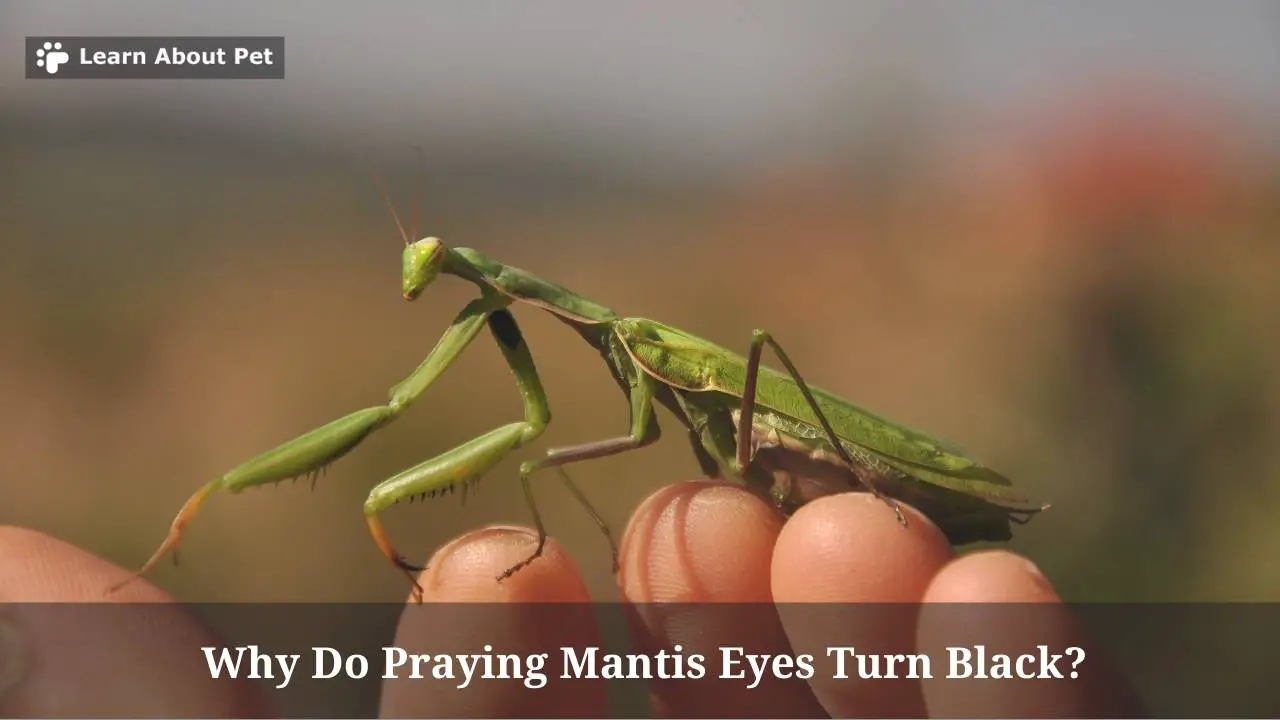
In case the mantis eyes are black due to low light conditions, it is nothing to worry about. It is a normal adaptation.
But if the mantis’ eyes are black due to dehydration, you need to offer urgent rehydration support.
And if the mantis’ eyes are black due to illness, you need to initiate treatment.
At the very least, take actions that can boost the mantis’ immunity (like feeding it better), so that it can ward off whatever bacterial or fungal infection may be troubling it.
As a pet lover, make sure to learn about pet more and give your pet mantis a good and comfortable life!

Welcome to Learn About Pet. My name is Rajkumar Ravichandran and I love all pets, travel, and amazing food. I write about my passion and personal experience caring for multiple pets in this blog! ❤️
Post Disclaimer
DISCLAIMER: THIS BLOG OR WEBSITE, "Learn About Pet", DOES NOT PROVIDE YOU WITH MEDICAL ADVICE AND IS NOT A SUBSTITUTE FOR MEDICAL ADVICE. ALWAYS GET IN TOUCH WITH YOUR PERSONAL VETERINARIAN AND USE INFORMATION HERE AS GENERAL ADVICE.
The information, including but not limited to, text, graphics, images and other material contained on this website are for informational purposes only. No material on this site is intended to be a substitute for professional veterinary advice, food recommendation, diagnosis, or treatment. Always seek the advice of your veterinarian or other qualified health care provider with any questions you may have regarding a medical condition or for pet food related questions.


